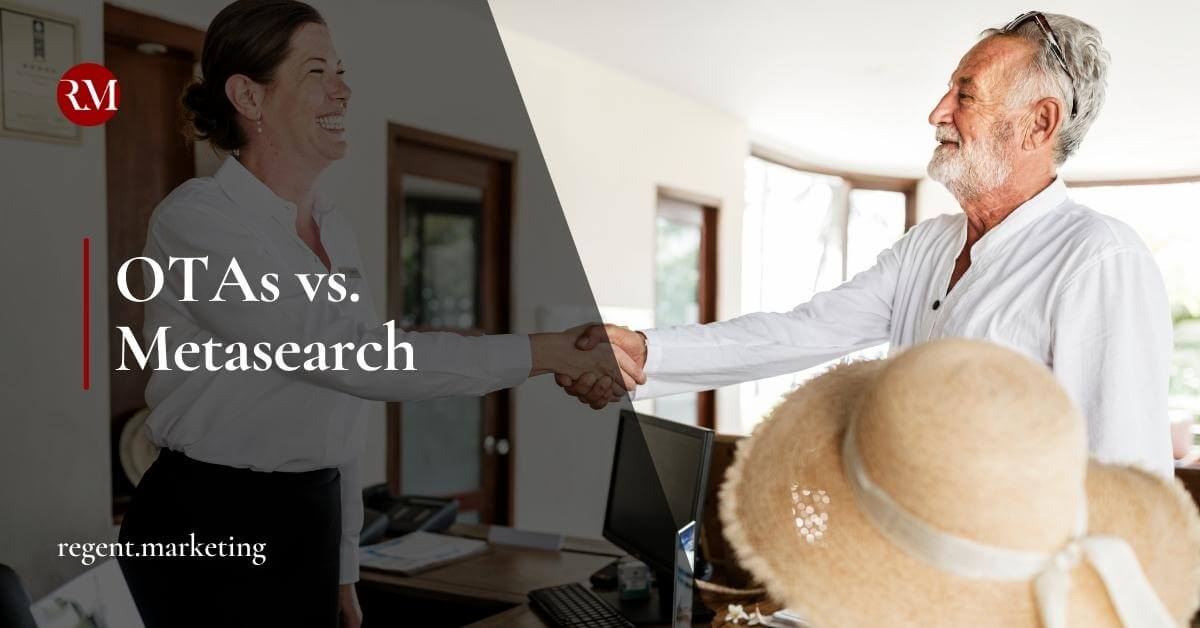
The Difference Between OTAs & Metasearch
How should you drive up your hotel bookings? Are OTAs or Metasearch Engines better for filling up your hotel rooms?
 Being a hotelier can be more complex than people think. The more and more technology develops, the more your marketing strategies and online presence make an impact on your hotel’s performance. Yet none are more vital than your relationship with OTAs and Metasearch.
Being a hotelier can be more complex than people think. The more and more technology develops, the more your marketing strategies and online presence make an impact on your hotel’s performance. Yet none are more vital than your relationship with OTAs and Metasearch.
So let’s work out exactly what each option entails. We’ll examine the important aspects of OTAs & Metasearch, and then work out the best approach for your hotel.
But it might not quite be the answer that you think…
Metasearch Engines: A Breakdown
Is Metasearch Better Than OTAs?
Should My Hotel Use OTAs or Metasearch?
OTAs: A Breakdown
Online travel agencies are the big boys of the hotel industry.
With millions of hotels all around the globe on Booking, they act as the middleman between guests and hoteliers. They consistently convert potential guests due to their enormous reach, influence and familiarity with guests.
However, there are three downsides to OTAs.
Firstly, you pay the bill. In countries where rate parity still exists, hoteliers must provide equal rates for direct bookings and for OTA bookings. However the OTA gets their money from somewhere, and they take that from you.
 Every booking through an OTA cost the guest the same as if it were a direct booking, but you have to pay the OTA 15-25% of the booking price. It’s a hard pill to swallow, and can damage your profit margins.
Every booking through an OTA cost the guest the same as if it were a direct booking, but you have to pay the OTA 15-25% of the booking price. It’s a hard pill to swallow, and can damage your profit margins.
Secondly, you no longer have control of the guest-hotelier relationship. To meet guest expectations you need to have lines of open communication with your guests both prior to and after check-in to ensure a comfortable stay. However, OTAs own the guest information and you can’t build a rapport on that alone.
Thirdly, OTAs always put you up against your compset.
With a direct booking, your potential guest is on your website and your website alone. When guests view your hotel through an OTA, they will also be bombarded by thumbnails of other hotels, other room rates and other discounts.
The OTAs don’t care whether guests stay specifically at your hotel. They only care that the customer books through them. This reasoning can also lead to brandjacking on your hotel, but that’s a story for another time.
Metasearch Engines: A Breakdown
Metasearch engines differ a huge amount from OTAs, and while they can be confusing we will try to simplify it as much as we can.
To start with, think of Metasearch Engines as Google, but strictly for hotel rooms.
That is, broadly speaking, the long and short of it. Whereas OTAs only show the rooms of hotels allotted to them by the venues, Metasearch Engines aggregate their results from every possible online channel. So guests will not only see the OTA room rates for your hotel, they will also see your direct booking websites.
Their comprehensive nature not only allows guests to have more control over where they book rooms from, but it also allows hotels to make more direct bookings and spend less money along the way.

However, there are some downsides to Metasearch Engines.
Firstly, while they do not work on cost-per-acquisition model (commission) like OTAs, they do work on cost-per-click models.
If you’re familiar with SEO and hotel marketing, think of Google Ads (or AdWords if you’re old school!) This gives you the chance to pay far less money than the costs involved with OTAs, but it can also run the risk of losing more money too.
When OTAs get involved in Metasearch Engines, they have a huge amount of budget to draw on. While you can happily pour money into the cost-per-click model, you face the possibility that you lose that money while being outbid by the OTAs.
Secondly, Metasearch has changed recently.
Some metasearch engines can now integrate with your hotel’s booking engine. Google is one of the top contenders, because let’s be honest, every good search starts with Google! Now while these particular metasearch engines, like OTAs, keep hold of your guest data, they also charge between 10-15% commission on average.
It’s a much more manageable rate than OTAs! However, with a bit of extra money, hotels can create their own unique profile on metasearch engines and take control of the guest experience from start to finish. It’s a huge opportunity, but one that requires serious thought, calculation and planning.
Is Metasearch Better Than OTAs?
In some ways, metasearch engines do appear better than OTAs.
 You pay less on commission with metasearch engines than compared to your rates on OTAs. The possibility of owning the guest experience from start to finish is a huge advantage that can help promote return guests. Not only that, but having Google representing your hotel is an enormous boon, especially to smaller, independent boutique hotels.
You pay less on commission with metasearch engines than compared to your rates on OTAs. The possibility of owning the guest experience from start to finish is a huge advantage that can help promote return guests. Not only that, but having Google representing your hotel is an enormous boon, especially to smaller, independent boutique hotels.
Yet OTAs are successful because they do fill rooms. They are trusted by guests. The older generation in particular have a huge attachment to OTAs such as Booking, and it can quite often be their first port of call. OTAs also have the added advantage of maintaining a steady stream of reservations especially in your off-season.
So is metasearch better than OTAs? Or are they simply different?
Should My Hotel Use OTAs or Metasearch?
OTAs and metasearch are not two sides of the same coin, but they are something similar.
They are both excellent marketing channels.
While it is difficult to leverage them as such, having your hotel listed on them can only build your hotel’s contact with potential guests. You will have to pay commission or bid for keywords in order to win rooms, but with proper hotel financial management you can manipulate both of these to fill your rooms for the lowest cost.
OTAs and Metasearch are here to stay, so make sure you make the most of their power, spread and market penetration. The more people that see your hotel, the better! When it comes to marketing your hotel, OTAs and Metasearch Engines are two side salads. They give you the important things that you need, but they aren’t the main dish:
Direct Bookings are!
Direct Bookings
If OTAs and Metasearch Engines are the side dishes, then Direct Bookings are the centrepiece of the meal. 
Direct Bookings give you control over the guest experience and cost you nothing in commission. With a direct booking you can begin the process of exceeding guest expectations and making sure they become a return guest. You can draw up loyalty schemes, membership cards, add-on packages for bleisure travellers.
You name it, you can do it. But the only way to drive direct bookings is with a hotel online presence that wakes wanderlust in the hearts of guests.
Is your website slow? Does your hotel SEO perform badly? Have you got a strong booking engine that encourages guests to book?
Find out the answers to these questions and much more with a free hotel marketing audit!
Free Hotel Marketing Audit
Our marketing audits are free and available to all hotels. Regardless of location, size or style we can pinpoint the weak points in your hotel marketing strategy. Simply fill out this form and we’ll return to you with a comprehensive marketing report for your hotel free of charge in less than 48 hours.
 After that we’ll arrange a one-on-one meeting to discuss the results and you’ll come away feeling more confident knowing what needs improving with your hotel website. For more information on hotel marketing, make sure to check out our hotel blogs section of our website to stay up-to-date on the latest tips, guides and goings-on of the hotel industry!
After that we’ll arrange a one-on-one meeting to discuss the results and you’ll come away feeling more confident knowing what needs improving with your hotel website. For more information on hotel marketing, make sure to check out our hotel blogs section of our website to stay up-to-date on the latest tips, guides and goings-on of the hotel industry!





Leave a comment: